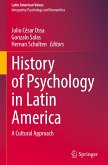This book examines the complexities of the colonization of the territory that is now Brazil and its shaping of psychological knowledge and practice. It reveals the rich network of cultural practices that were formed through the appropriation of elements of Jesuit Catholicism and the blending with elements of the cultures of native, African and Lusitanian populations present in the territory, and how psychological concepts and practices emerged and circulated between the sixteenth and the late eighteenth centuries, long before the establishment of psychology as a modern science.
The volume summarizes the research program developed by the author over 38 years of academic activity through which she contributed to expand the field of historical studies in psychology by investigating how psychological concepts and practices were produced in cultural and historical contexts different from the European and North American societies where scientific psychology developed in the 19th and 20th centuries.
Psychological Knowledge and Practices in Brazilian Colonial Culture will be of interest not only to historians of psychology, but also to professional psychologists working with culturally diverse populations who seek to understand how psychological concepts and phenomena are shaped by culture. By doing so, the book intends to contribute to the development of a psychology better prepared to deal with cultural diversity in an increasingly multicultural world.
"Massimi's book will now form an important foundation of English-language scholarship about the psychological and cultural impact of colonization on subjugated peoples. She has, of course, made many such contributions in Portuguese. It is to be hoped that much of her work will be translated into English so that more scholars may benefit from the richness of her insights." - Excerpt from the Foreword by Dr. Wade E. Pickren.
The volume summarizes the research program developed by the author over 38 years of academic activity through which she contributed to expand the field of historical studies in psychology by investigating how psychological concepts and practices were produced in cultural and historical contexts different from the European and North American societies where scientific psychology developed in the 19th and 20th centuries.
Psychological Knowledge and Practices in Brazilian Colonial Culture will be of interest not only to historians of psychology, but also to professional psychologists working with culturally diverse populations who seek to understand how psychological concepts and phenomena are shaped by culture. By doing so, the book intends to contribute to the development of a psychology better prepared to deal with cultural diversity in an increasingly multicultural world.
"Massimi's book will now form an important foundation of English-language scholarship about the psychological and cultural impact of colonization on subjugated peoples. She has, of course, made many such contributions in Portuguese. It is to be hoped that much of her work will be translated into English so that more scholars may benefit from the richness of her insights." - Excerpt from the Foreword by Dr. Wade E. Pickren.








